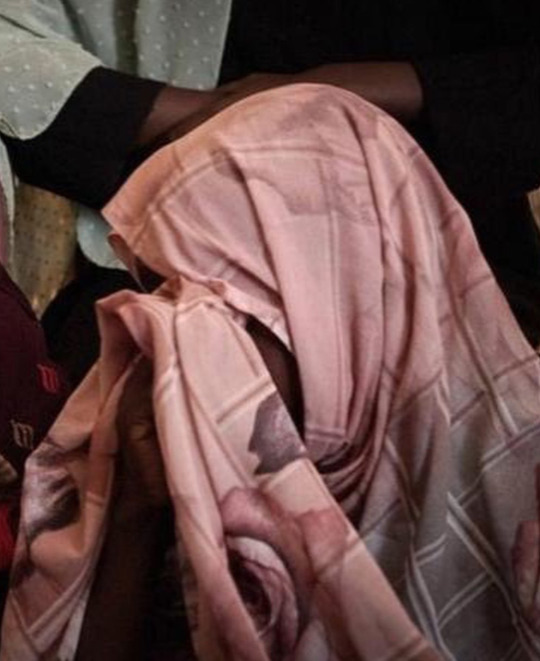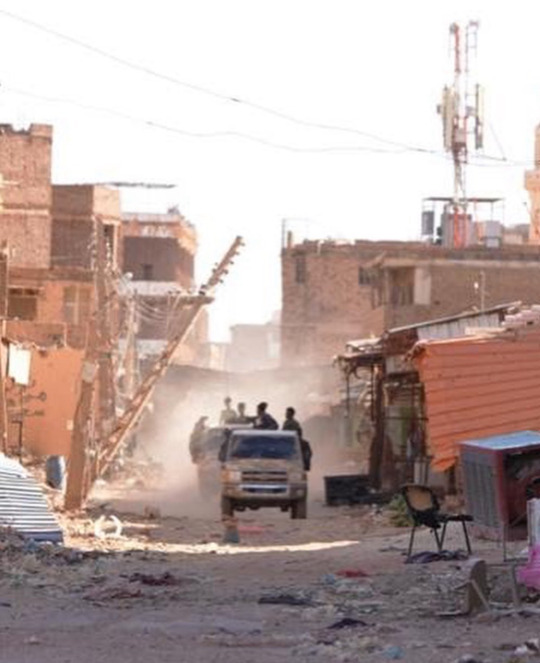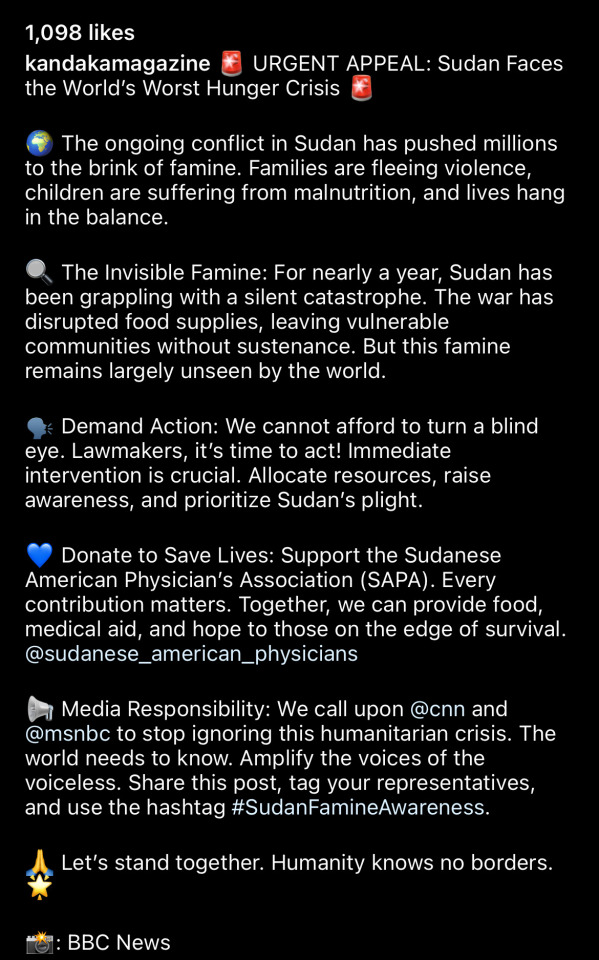#sudan war
Text
Donation train for Eman!
I've just donated 20 CHF to Eman's fundraiser. If you see this and have the means, please donate to her campaign and make a reblog saying that you've donated!
Eman's family is in danger right now and they need to evacuate Sudan as soon as possible. It has already been several months, and Eman is still not yet even halfway to her goal.
I want to try to exceed the halfway point within the next week. We're almost there. If you can't match my donation, please reblog and share. Ask a friend and see if they can donate. Everything helps.
231 notes
·
View notes
Text


48 million people in Sudan still can not contact their families across the diaspora. They're cut off from the internet, which includes their online banking services as well. Thousands of displaced Sudanese people were also recently turned away as asylum seekers:

This continues to be horrifying. Please keep talking about Sudan.
#feminist#social justice#sudan war#sudan crisis#sudan genocide#eyes on sudan#free sudan#keep eyes on sudan#sudan#world news#global news#rsf#human rights violations#liberate sudan#telecommunications blackout#telecommunications
17K notes
·
View notes
Text
let's help Amal For Women provide aid to families in Sudan! If you cannot donate, spread this around! as of 2/22/2024, their GFM has only raised $55 out of the $10,000 goal -- it only received six donations.
GFM: https://gofund.me/2484e5bf
other donation options: https://linktr.ee/amalforwomen
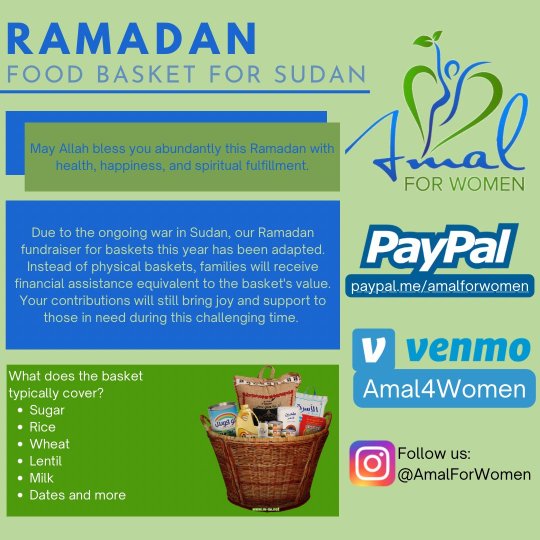
Original post by @Kandakat_alhaqq on Twitter:
"My organization, Amal For Women (http://Amalforwomen.org), annually conducts a Ramadan food basket initiative for Sudan. Our nonprofit previously funded businesses for single mothers pre-war, alongside a successful orphan sponsorship campaign. Traditionally, we fundraised before Ramadan and our Sudanese representatives procured and distributed the baskets to families in need. However, due to the ongoing war, this year we're shifting to providing financial assistance instead of physical baskets, prioritizing safety and practicality in aid distribution. Typically, each basket costs around $70 and includes essential items like rice, sugar, tea, onions, wheat, cooking oil, pasta, dates, milk, and lentils. Rest assured, funds will be transparently and accountably distributed by trusted representatives. Your support directly aids those affected by conflict, so please share this initiative with your family and friends.
💚 GoFundMe: https://gofund.me/2484e5bf.
💚 Multiple donation options: https://linktr.ee/amalforwomen
#keepeyesonsudan"
#amal for women#sudan crisis#sudan#eyes on sudan#keep eyes on sudan#free sudan#sudan war#sudan aid#sudanese genocide#ramadan
2K notes
·
View notes
Text

[thread here]
#sudan#help sudan#sudan crisis#eyes on sudan#sudan genocide#free sudan#keep eyes on sudan#war news#sudan war#sudan war updates#Twitter#@nnoeleeisaround#links
2K notes
·
View notes
Text
TALK ABOUT SUDAN
Sudan-a country located in northeastern Africa at the southern edge of Sahara- has been facing an ongoing civil war since April 15th of 2023. About 13,000 citizens have been killed, including children, elderly, woman, and men. More than 8 million citizens have been displaced. About 70,000+ children are facing life-threatening malnutrition, the numbers are steadily increasing. The war in Sudan is triggering the ‘world’s largest hunger crisis.’
It’s a civil war between two rival factions of the military government of Sudan, the Sudanese armed forces (SAF) and the Rapid Support Forces (RSF). Even before the war started, the Sudanese governed was in complete shambles. In almost daily protests for peace and justice, at least over 50 citizens would be killed ‘accidentally’ (they would have bullet wounds in their heads, chests, and other vital areas), women would be kidnapped and harassed by the ‘RSF’, children and citizens would randomly go missing only to be found in underground freezers meant to be used for fruits and other resources.
Right now, more than 25 million people are facing starvation and dangerous disease. We’re almost 11 months into Sudan war, yet not many people are speaking about this. Please take your time to open the link down below, you don’t even need to donate, just share the link to other people who might be able to.
Here
#explore#foryou#keep eyes on sudan#free sudan#sudan crisis#sudan genocide#talk about sudan#sudan war#politics#war crimes#blueforsudan
558 notes
·
View notes
Text
Current crisis in Sudan! A blackout has been going on for weeks now!

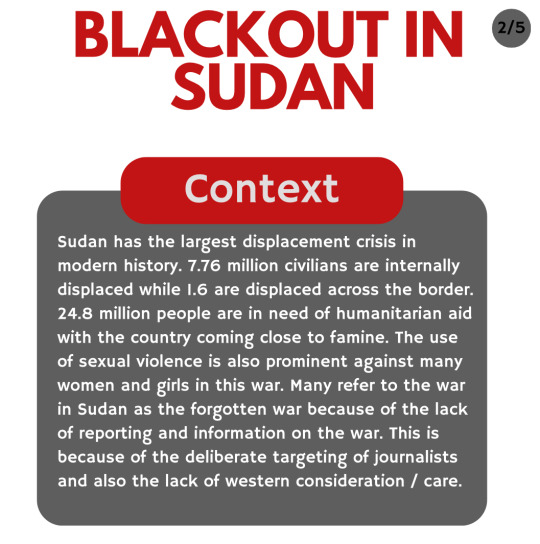
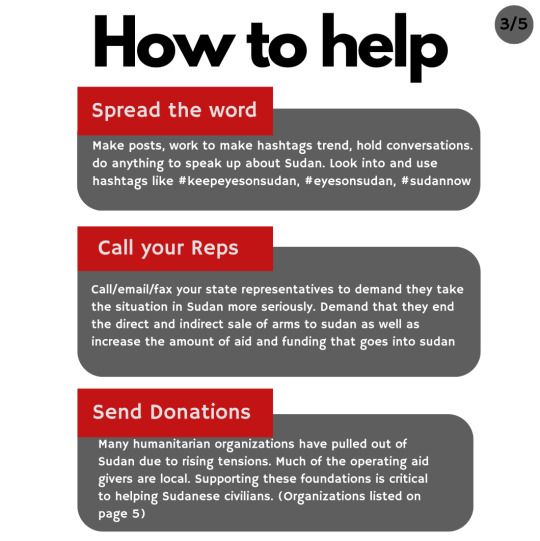

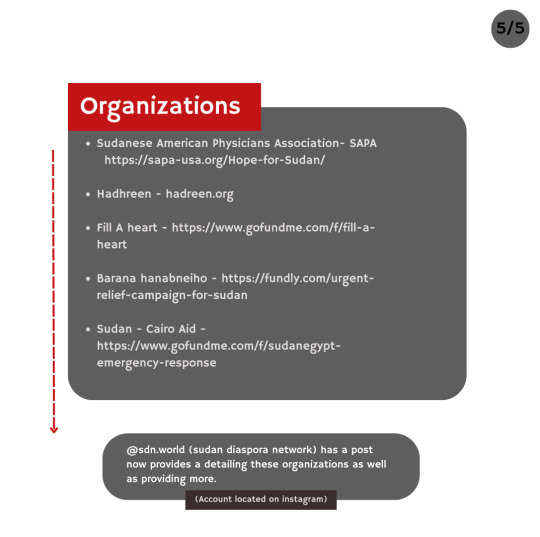
607 notes
·
View notes
Text
Why Sudanese don't document their genocide ( NOT MY POST I AM ONLY SHARING)
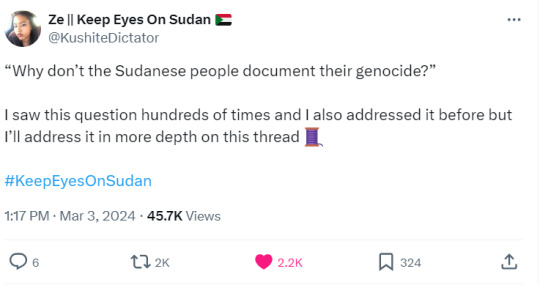


Keep Eyes on Sudan.
#free palestine#free sudan#sudan genocide#sudan crisis#sudan war#keep eyes on sudan#silent genocide#eyes on sudan
381 notes
·
View notes
Text
instagram
Please watch this video by Yassmin Abdel-Magied and visit her Instagram page (linked with video) for information on how to help.
Right now the militant group the Rapid Support Forces are preparing the next stage of a genocide they began in 2003. Over 800,000 people are living or seeking refuge in El-Fasher, Sudan, and the vast majority of them are members of indigenous peoples such as the Fur and the Massalit. These peoples have been the targets of genocide since at least 2003, when the RSF (then known as the Janjaweed or Devils on Horseback) began ethnically cleansing them from Darfur. Now, with so many displaced people gathered in El-Fasher due to the ongoing war, a massacre of horrifying proportions is imminent. Unless international pressure is successfully mounted against the RSF’s financier, 800,000 people are going to be murdered.
Visit EyesOnSudan.net and DarfurWomenAction.org and their partners for more information on the war, and opportunities for action and support
#Sudan#keep eyes on sudan#free sudan#sudan crisis#sudan war#save sudan#darfur genocide#el fasher#save el fasher#eyes on sudan#sudan genocide#talk about sudan#sudan updates#Instagram
254 notes
·
View notes
Text
🚨Link to donate !
#Sudan#free Sudan#eyes on Sudan#please donate#donate#link to donate#help Sudan#Sudan war#free palestine#fyp#the eras tour#mcu
356 notes
·
View notes
Text
Sudan War
The Sudanese people are in need of your support!!!
The Sudanese people are still suffering and facing the most heinous crimes, violations, forced displacement, killings, and rapes by the Rapid Support Forces militia, which has been fighting against the army and Sudanese citizens for more than 240 days, over eight months. Every day, this militia expands and enjoys making the lives of Sudanese citizens a living hell. In the past 72 hours, this militia has expanded and reached the Gezira state, where millions of Sudanese have already been displaced, leaving the capital, Khartoum, to preserve what remains of their lives. However, they are also being pursued outside the capital. This militia is like cancer; wherever it touches, it kills.
Truly, the Sudanese people need your support and solidarity in their fight against this brutal, bloodthirsty, terrorist militia. The least you can do to support us is to convey our suffering and our voice to the entire world, so that the Rapid Support Forces militia can be classified as a terrorist organization and pursued through international criminal courts, exposing anyone who supports this terrorism and holding them accountable.
You can participate using the hashtag #KeepEyesOnSudan #Sudan_War_Updates #انقذوا_السودان
204 notes
·
View notes
Text
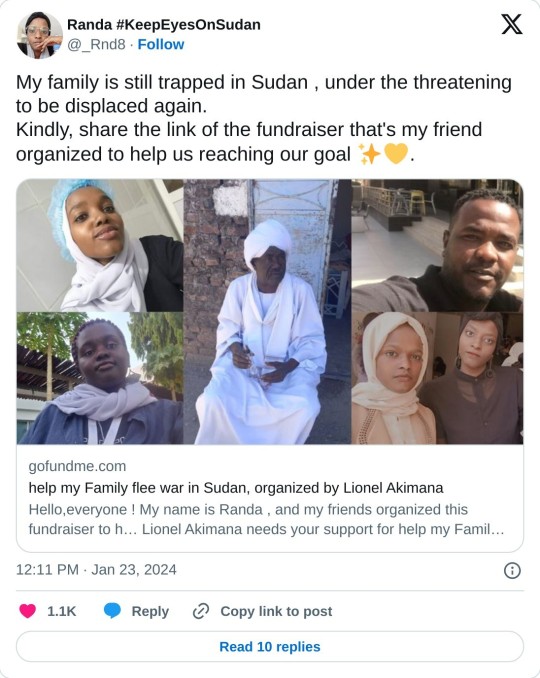
Please help this Sudanese family get to safety!! Reblogs are much appreciated!!
13K notes
·
View notes
Text
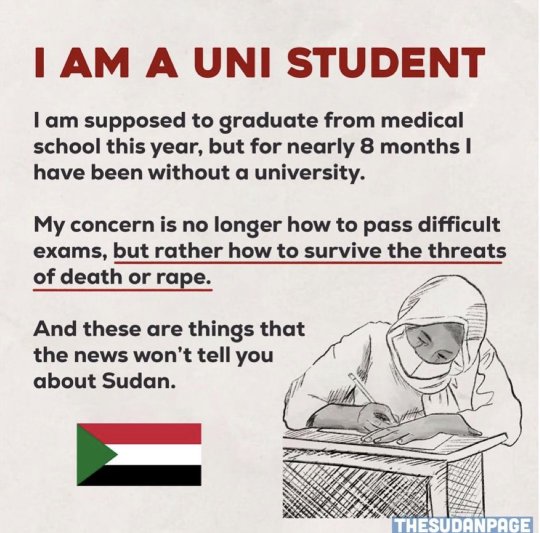
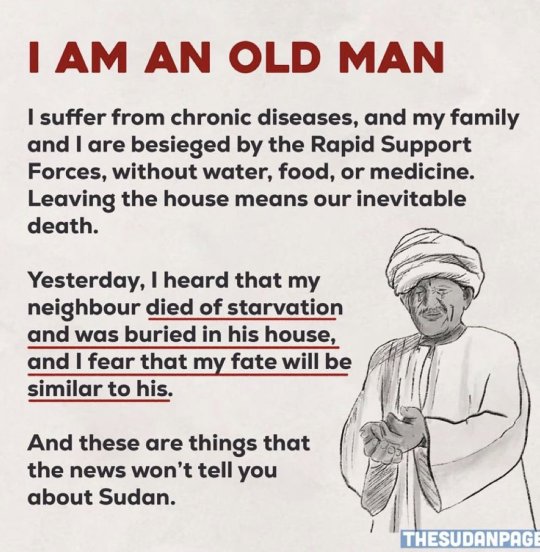

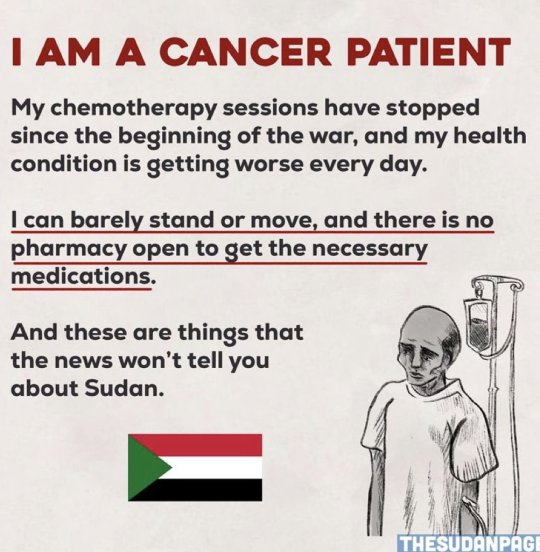
Source: [@/ Kandakat_alhaqq on X.] You can follow them here for more updates.
Free Sudan!
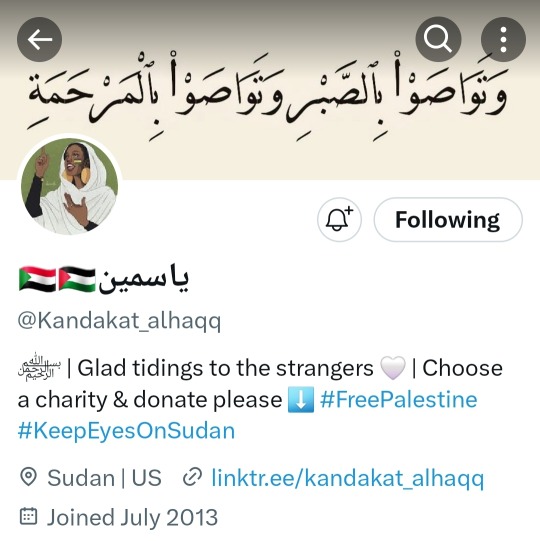
#keep eyes on sudan#liberate sudan#eyes on darfur#free sudan#sudan crisis#eyes on sudan#sudan#sudan genocide#darfur#current events#sudan war#tw child death#tw sa mention#gender violence#violence against women#human rights violations#crimes against humanity#human rights#feminist#feminism
3K notes
·
View notes
Text
Because I struggled to find information on the Sudanese genocide, here's a collection of info I've found, complete with sources and ways to help.
Note: Most of these stats are coming from October of 2023, and numbers have climbed since. Content warning for genocide, war crimes, sexual violence, and more. Please correct me on anything you notice is incorrect.
In April of 2023, the Rapid Support Forces attacked Sudanese Armed Forces bases across Sudan. including the Sudanese capital Khartoum with a population of 6,344,348. While this was initially described as a war between the RSF & SAF, it quickly became a matter that murdered, injured, & displaced millions of civilians. The most notable of the casualties - actress Asia Abdelmajid, singer Shaden Gardood, and former football player Fozi el-Mardi with his daughter Alaa. el-Mardi's wife. Zeinat Ahmed Othman was also wounded by a bullet.
There have been over 9,000 deaths, 12,000 injuries, and 5.4M displacements. There have been a total of 55 foreign deaths from the countries of Ethiopia (15), Syria (15), Congo (10), Eritrea (9), Egypt (2), The USA (2), India (1), and Turkey (1). Journalists and humanitarian workers have been injured, killed, and/or detained.
As of July, there have been 88 reports of sexual assault against women in Sudan blamed on the RSF. Activist Hala al-Karib stated that war rape had become an everyday occurrence with both fighting parties participating.
Over 1.3M people have fled Sudan as refugees. "The UN Office for the Coordination of Humanitarian Affairs said that 1,200 children had died from disease outbreaks in refugee camps in White Nile State since May. In Central Darfur, the head of the Hamidiya refugee camp said at least 43 children had died in the camp since July. UNICEF also estimated that the conflict had led to the number of children being out of school in Sudan to rise from seven million prior to the fighting to 19 million in October 2023." - War in Sudan 2023 Wikipedia
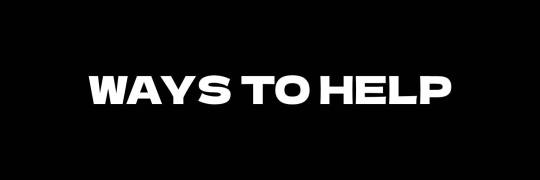
An imminent epidemic of cholera and a collapse of the healthcare system - How to help: donate to SAPA at https://sapa-usa.org
Women are at risk of sexual violence (especially in areas like Darfur) - The Darfur Women Action Group has a donation link AND sample emails to send to your officials They also accept volunteers with media experience
Menstruation doesn’t stop due to war. - Donate to provide Sudanese girls and women with menstrual products
Another IMPORTANT organization currently providing direct medical care in a few states including Khartoum
will hopefully update with more reliable links or resources Also check
@Hometaxsd on Twitter (X) and eyesonsudan.net for other reliable donation sites
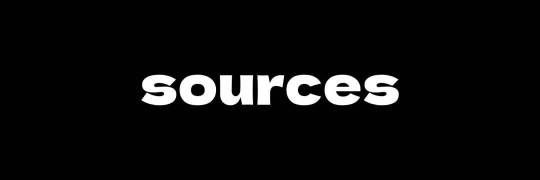
https://bbc.com/news/world-africa-65284945…
https://bbc.com/news/world-africa-65467934…
https://bbc.com/news/world-africa-65585746…
https://apnews.com/article/sudan-war-military-rsf-conflict-khartoum-f12975eb72c830ed86ed6a7a49e9658d…
https://dabangasudan.org/en/all-news/article/violations-against-journalists-in-sudan-war…
https://reliefweb.int/report/sudan/dtm-sudan-monthly-displacement-overview-october-2023…
https://english.aawsat.com/home/article/4296896/diplomat-says-15-syrians-killed-amid-clashes-sudan…
https://theguardian.com/world/2023/may/07/eritrea-accused-of-forcibly-repatriating-civilians-caught-up-in-sudan-fighting…
https://abcnews.go.com/US/2nd-american-dies-amid-violence-sudan-state-department/story?id=98877370
dabangasudan.org/en/all-news/article/more-than-40-children-die-in-central-darfur-camps-as-fighting-escalates…
https://dabangasudan.org/en/all-news/article/19-million-children-in-sudan-are-out-of-school-says-unicef
https://www.aa.com.tr/en/africa/turkish-toddler-killed-in-ongoing-clashes-in-sudan/2875179
bnnbreaking.com/breaking-news/egyptian-doctors-killed-in-sudan-conflict-buried-in-backyard/…
https://bbc.com/news/world-africa-65821597…
https://africanews.com/2023/09/19/un-raises-alarm-over-child-deaths-in-sudan-as-health-crisis-deepens/…
https://aljazeera.com/news/2023/7/2/fighting-reignites-between-sudan-army-rsf-in-khartoum
The linked source is a more detailed Twitter thread of Sudan's timeline starting in December 2018 by Kandakat_alhaqq.
#stop the genocide#sudan#free sudan#sudan genocide#sudan war#sudanese#eyes on sudan#sudan crisis#darfur
156 notes
·
View notes
Text
Linktree with more information on the crisis happening in Sudan + ways to help:
Some more places to donate to:
#free sudan#keep eyes on sudan#sudan genocide#sudan crisis#sudan war#sudan#none of us are free until all of us are free
76 notes
·
View notes
Text
#Sudan#sudan conflict#free sudan#sudan war#sudan crisis#sudan genocide#keepeyesonsudan#important#please boost#signal boost#news#american news#sudanese
96 notes
·
View notes

